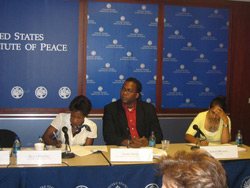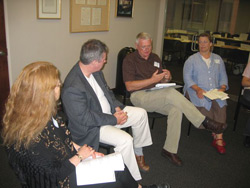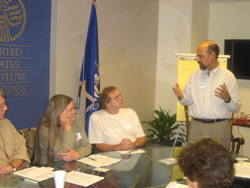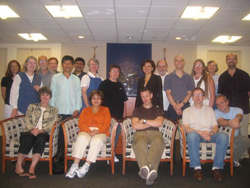Global Peace and Security in Community Colleges and the Communities They Serve
Overview | The Program | Seminar Faculty | Participants | Travel, Meals, and Housing | Apply
When: June 3–June 7, 2009
Where: U.S. Institute of Peace in Washington, D.C.
Application Deadline: The application deadline was March 20, 2009.
 The United States Institute of Peace announces its summer seminar designed for community college faculty and administrators. The seminar is designed to give participants an opportunity to carefully examine the nature of international peace and security and how community colleges can relate this to the constituencies they serve.
The United States Institute of Peace announces its summer seminar designed for community college faculty and administrators. The seminar is designed to give participants an opportunity to carefully examine the nature of international peace and security and how community colleges can relate this to the constituencies they serve.
In the post 9/11 world, issues of global peace and security have taken on heightened importance. Historically, community colleges have been on the front line of public education in areas of national significance, and in training and educating populations often charged with ensuring health, safety, and security. With increasing globalization, community colleges have sought ways for their local communities to benefit from new markets and opportunities. This has created challenges for community colleges in serving multiple audiences seeking to better understand and benefit from this new environment. Community colleges provide the higher education entry point for America’s growing immigrant population. A community college classroom is likely to represent the widest range of cultures and ethnicities. Because of their draw to new arrivals, open enrollment policies, and affordable costs, it is not surprising that community colleges are often referred to as “democracy’s colleges.” This new environment has charged community colleges with strong mandates to better understand the world today, and in particular, promote global peace and security.
 Complex international factors shape the nature of violent conflict today. Strong forces such as political and economic transformation, nationalism, ethnic identification, terrorism, and religious intolerance are affecting relations between nations as well as among ethnic and religious groups. This often has lead to war and violence. At the same time, there are efforts by an increasing number of actors to engage in resolving these acute problems.
Complex international factors shape the nature of violent conflict today. Strong forces such as political and economic transformation, nationalism, ethnic identification, terrorism, and religious intolerance are affecting relations between nations as well as among ethnic and religious groups. This often has lead to war and violence. At the same time, there are efforts by an increasing number of actors to engage in resolving these acute problems.
The intricacies of global conflict present challenges to community college faculty and administrators to stay current with a rapidly changing world, develop a deeper understanding of the nature and consequences of the transformations, and find effective ways of making these issues relevant and interesting to students and in the communities in which they live.
The seminar will include examinations of major issues surrounding peace, conflict, and security, and of specific examples illustrative of these broad themes. The program will be structured around the areas of conflict analysis and prevention, conflict resolution and management, and post-conflict reconciliation. Institute specialists and outside authorities will present on the current state of global conflict. Factors that influence conflicts such as the role of the United Nations and regional organizations; preventive diplomacy; arms proliferation and arms control; peacekeeping, peacemaking, and peacebuilding; and international mediation and negotiation will be closely examined.
 In addition to providing content analysis, the seminar will focus on particular methods and approaches used to teach about these issues with a special emphasis on community college needs. Presenters will include educators who will focus on the effective ways in which students can be engaged such as through role-plays and simulations, service learning, and multimedia. Ample opportunity for discussion will be provided, along with curriculum materials such as readings, bibliographies, and case studies. Participants will be expected to work on incorporating seminar material into their programs and will be asked to design a model syllabus or project and present it at the end of the seminar.
In addition to providing content analysis, the seminar will focus on particular methods and approaches used to teach about these issues with a special emphasis on community college needs. Presenters will include educators who will focus on the effective ways in which students can be engaged such as through role-plays and simulations, service learning, and multimedia. Ample opportunity for discussion will be provided, along with curriculum materials such as readings, bibliographies, and case studies. Participants will be expected to work on incorporating seminar material into their programs and will be asked to design a model syllabus or project and present it at the end of the seminar.
Leading scholars, analysts, practitioners, and policymakers involved in the study of global peace and security, and in the field of community college education will serve as faculty for the seminar. These individuals will be drawn from specialists among the Institute’s staff as well as experts from the Washington academic and policy community.
The seminar is open to all faculty and administrators who are employed at a U.S. community or junior college. (International applicants will be considered, however, if accepted they will be responsible for their transportation costs to a U.S. entry point, and arranging for their travel documents). The Institute is seeking participants who reflect the broad diversity found in community colleges. The Institute encourages an interdisciplinary approach to the study of peace and security and therefore solicits applications from a wide array of fields typically found in a community college including but not limited to political science, history, communication studies, human development, criminal justice, business, nursing, sociology, literature, anthropology, philosophy, and religion. How well the seminar relates to the applicant’s current and future teaching assignments or administrative duties will be taken into consideration for acceptance. The Institute is particularly interested in participants who are seeking to promote new curriculum and activities that emphasize global peace and security.
Travel, Meals, and Housing
 Each participant will be provided with an incidental expenses and travel allotment (for travel from their home to Washington, D.C.). All lodging and some meals will be provided by the U.S. Institute of Peace.
Each participant will be provided with an incidental expenses and travel allotment (for travel from their home to Washington, D.C.). All lodging and some meals will be provided by the U.S. Institute of Peace.
How to Apply
The application deadline for this program was March 20, 2009.
Download the Application
PDF 159KB